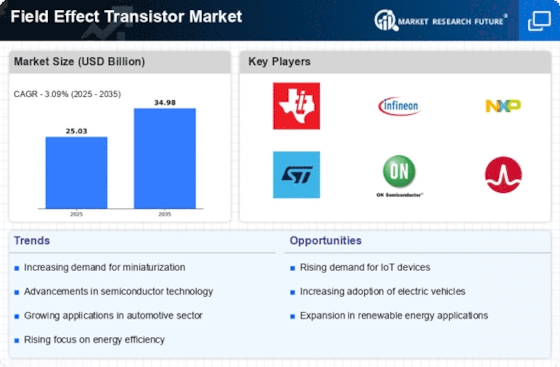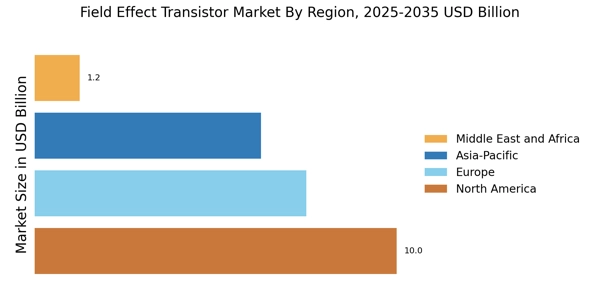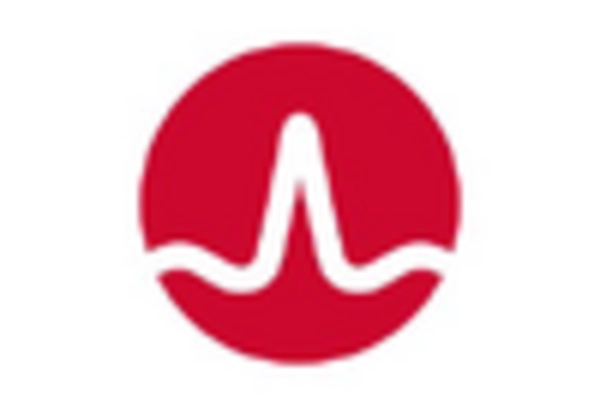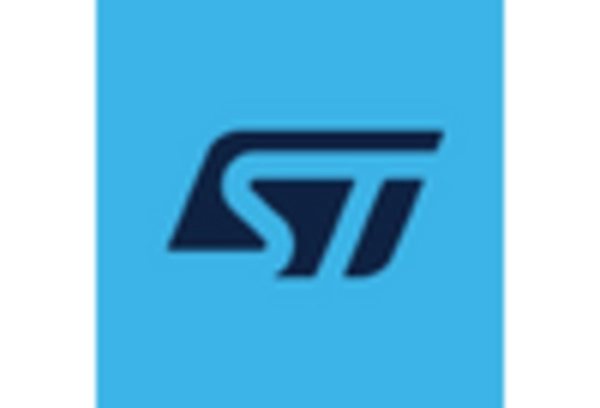Integration of IoT Technologies
The integration of Internet of Things (IoT) technologies is significantly influencing the Field Effect Transistor Market. As more devices become interconnected, the need for efficient and reliable semiconductor components has surged. Field effect transistors are crucial in IoT applications, enabling low-power operation and high-speed data processing. The IoT market is anticipated to expand at a remarkable rate of approximately 15% annually, driven by advancements in connectivity and data analytics. This rapid growth indicates a favorable environment for field effect transistor manufacturers, as they develop products tailored to the specific requirements of IoT devices and applications.
Growth in Renewable Energy Sector
The Field Effect Transistor Market is poised to benefit from the growth in the renewable energy sector. As nations increasingly prioritize sustainable energy sources, the demand for efficient power conversion and management systems has escalated. Field effect transistors are essential components in solar inverters and wind turbine controllers, facilitating the conversion of renewable energy into usable power. Market analysis indicates that the renewable energy sector is expected to grow at a rate of approximately 10% per year, driven by technological advancements and supportive government policies. This trend suggests a promising landscape for field effect transistor manufacturers, as they align their products with the evolving needs of the renewable energy market.
Advancements in Automotive Electronics
The automotive industry is undergoing a transformation, with a significant shift towards electrification and advanced driver-assistance systems (ADAS). This evolution is a key driver for the Field Effect Transistor Market. Field effect transistors are increasingly utilized in electric vehicles (EVs) and hybrid vehicles for power management and control applications. The automotive electronics market is projected to grow at a compound annual growth rate of around 7% in the coming years, fueled by the rising adoption of EVs and stringent emission regulations. This growth presents a substantial opportunity for field effect transistor manufacturers to innovate and provide solutions that meet the demands of modern automotive applications.
Rising Demand for Consumer Electronics
The Field Effect Transistor Market is experiencing a notable surge in demand driven by the proliferation of consumer electronics. As devices such as smartphones, tablets, and wearables become increasingly sophisticated, the need for efficient power management and signal processing has intensified. Field effect transistors, known for their low power consumption and high switching speeds, are integral to these applications. According to recent data, the consumer electronics sector is projected to grow at a compound annual growth rate of approximately 6% over the next few years, further propelling the demand for field effect transistors. This trend indicates a robust market potential for manufacturers and suppliers within the Field Effect Transistor Market, as they adapt to the evolving needs of consumers and technology developers alike.
Expansion of Telecommunications Infrastructure
The expansion of telecommunications infrastructure is a critical driver for the Field Effect Transistor Market. With the increasing reliance on high-speed internet and mobile connectivity, there is a pressing need for advanced semiconductor components that can support these technologies. Field effect transistors play a pivotal role in amplifying signals and managing power in telecommunications equipment. Recent statistics suggest that investments in telecommunications infrastructure are expected to reach unprecedented levels, with a projected growth rate of around 8% annually. This growth is likely to create substantial opportunities for field effect transistor manufacturers, as they cater to the demands of network providers and equipment manufacturers striving to enhance service quality and coverage.














